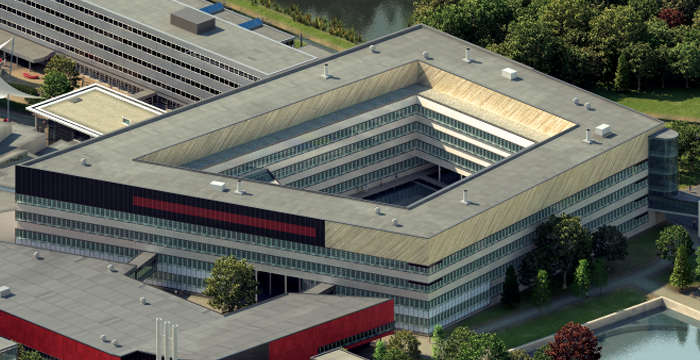Jurriaan Schmitz was born in Elst, The Netherlands in 1967. He received his M.Sc. (1990, with honors) and Ph.D. (1994) degrees in Experimental Physics at the University of Amsterdam on research carried out at the Nikhef research institute. In 1990 he was a CERN Summer Student. His research work was on new detectors for tracking and energy measurement of high-energy particles, the so-called MSGC and Spaghetti Calorimeter detectors. In this period he proposed the Micro Trench Gas Counter, employing constant-field rather than radial-field gas amplification, and the DME/CO2 gas mixture for miniaturized gaseous detectors.
After his Ph.D. he joined Philips Research as a Senior Scientist (1994-2002), studying CMOS transistor scaling, characterization and reliability. He worked on CMOS transistors from the 0,25 µm to the 90-nm node, studying super-steep retrograde wells, halo (pocket) implants, shallow junctions, GeSi gates, gate depletion and gate-last fabrication. Later he concentrated on characterization and reliability of CMOS devices, and studied the measurement issues arising from excessive gate leakage. He proposed the RF-CV characterization technique. He patented several new transistor architectures as well as inventions related to embedded flash memories and CMOS-APS image sensors.
In 2002 he became full professor at the University of Twente as the successor of Prof. Hans Wallinga. He expanded his research interests to include above-IC technologies and light-from-silicon. With his coworkers and PhD students he worked on a variety of topics in the areas of microfabrication, characterization and reliability. He currently heads a research group of ~30 people, the group Integrated Devices and Systems. In recent years he has shifted his research and teaching focus towards the energy transition and photovoltaics.
He fulfilled several functions in international conferences including IEEE IEDM, ESSDERC, IEEE IRPS and IEEE ICMTS. Also he was Editor of IEEE Electron Device Letters in 2013-2017 and of MDPI Sensors in 2018-2022. He served as board member of the Dutch Physical Society (NNV), board member of SAFE, chairperson of the IEEE EDS chapter Benelux and he was a member of the Program Council of the Materials Innovation Institute (M2i) and PointOne.
Prof. Schmitz authored or co-authored over 240 journal and conference papers, 18 patents, and three book chapters.
Expertise
Material Science
- Temperature
- Devices
- Silicon
- Tungsten
- Metal
- Electrical Resistivity
Physics
- Electric Potential
- Wafer
Organisations
Jurriaan Schmitz was born in Elst, NL in 1967. He studied in Experimental Physics at the University of Amsterdam and the Nikhef research institute. In 1990 he was a CERN Summer Student. His research work was on MSGC and Spaghetti Calorimeter. He proposed the Micro Trench Gas Counter; and the DME/CO2 gas mixture for miniaturized gaseous detectors. He joined Philips Research as a Senior Scientist (1994-2002), studying CMOS transistor scaling, characterization and reliability. He proposed the RF-CV characterization technique and patented several new transistor architectures.
In 2002 he became full professor at the University of Twente. He expanded his research interests to include above-IC technologies and light-from-silicon. He worked on a variety of topics such as energy harvesting microchips, radiation imaging detectors on CMOS, and RF-CMOS and RF-MEMS reliability.
In recent years he has shifted his research and teaching focus towards the energy transition and photovoltaics.
Publications
Jump to: 2026 | 2025 | 2024 | 2023 | 2022
2026
2025
2024
2023
2022
Research profiles
For bachelor students, Schmitz teaches about the MOSFET in the electrical engineering program, about the Manhattan Project in the Honours program and about the Energy Transition in the minors.
For master students, he is the main teacher of the course Integrated Circuit Technology. He further teaches in the courses Solar Energy, Measurement Systems for Mechatronics, Technology, Fabrication of Nanostructures and Energy Conversion Systems.
Besides these, he supervises students for internships and BSc and MSc final projects.
Further, he is a member of the Honours Educational Quality Committee and of the UT-wide College van Beroep voor de Examens.
Affiliated study programs
Courses academic year 2025/2026
Courses in the current academic year are added at the moment they are finalised in the Osiris system. Therefore it is possible that the list is not yet complete for the whole academic year.
- 191210730 - Fabrication of Micro- and Nanodevices
- 191210930 - Measurement Systems for Mechatronics
- 191211208 - Internship EE
- 191211219 - Master Thesis Project
- 191211440 - Integrated Circuit Technology
- 191211650 - Multi-Disciplinary Design Project
- 201600187 - Individual Project
- 201700025 - Solar Energy
- 201700027 - Master Graduation Assignment
- 201700174 - Internship & Job Orientation Project NT
- 201900223 - Capita Selecta Electrical Engineering
- 202001146 - Semiconductor Devices
- 202001162 - Bachelor Thesis EE
- 202001434 - Internship EMSYS
- 202300020 - Energy Transition Challenges
- 202300070 - Final Project EMSYS
- 202400337 - Energy Transition Perspectives
- 202500473 - Internship EE / NT 30 EC
- 202500474 - Master Thesis Project EE / NT
- 202500533 - The Climate Dialogue
Courses academic year 2024/2025
- 191210730 - Fabrication of Micro- and Nanodevices
- 191210930 - Measurement Systems for Mechatronics
- 191211208 - Internship EE
- 191211219 - Master Thesis Project
- 191211440 - Integrated Circuit Technology
- 191211650 - Multi-Disciplinary Design Project
- 201600187 - Individual Project
- 201700025 - Solar Energy
- 201700027 - Master Graduation Assignment
- 201700174 - Internship & Job Orientation Project NT
- 201900223 - Capita Selecta Electrical Engineering
- 202001146 - Semiconductor Devices
- 202001162 - Bachelor Thesis EE
- 202001293 - Manhattan Project
- 202001434 - Internship EMSYS
- 202300020 - Energy Transition Challenges
- 202300070 - Final Project EMSYS
- 202400337 - Energy Transition Perspectives
Address

University of Twente
Carré (building no. 15), room C2617
Hallenweg 23
7522 NH Enschede
Netherlands
University of Twente
Carré C2617
P.O. Box 217
7500 AE Enschede
Netherlands